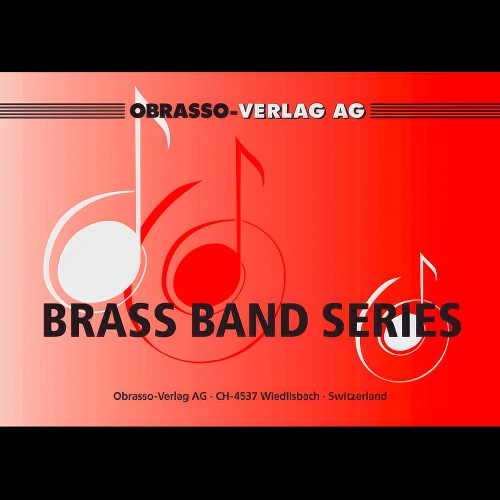Results
-
 £42.70
£42.70Birthday Greetings (Brass Band - Score and Parts) - Fernie, Alan
Marchcard sizeMarch with Trio including Happy Birthday
Estimated dispatch 7-14 working days
-
 £54.99
£54.99The Logical Song (Brass Band - Score and Parts)
The Logical Song was written by the lead singer of the famous British pop band Supertramp - a song about a happy, carefree child growing up to become a cynical adult. It was one of the group's biggest worldwide hits. Andr? Waignein's brass band arrangement will be a big hit with all Supertramp fans and may well attract many new fans! 03:40
Estimated dispatch 7-14 working days
-
 £14.99
£14.99The Logical Song (Brass Band - Score only)
The Logical Song was written by the lead singer of the famous British pop band Supertramp - a song about a happy, carefree child growing up to become a cynical adult. It was one of the group's biggest worldwide hits. Andr? Waignein's brass band arrangement will be a big hit with all Supertramp fans and may well attract many new fans! 03:40
Estimated dispatch 7-14 working days
-
 £30.00
£30.00Say Cheese - Jock McKenzie
I felt the urge to write something happy; something with a smile on its musical face. The end result...? Well, maybe it wears more of an inane grin than anything else, but at least it's cheesy! A bit of a sun-drenched, lively Latin groove built around a persistent (almost to the point of annoyance) four bar harmonic 'vamp', this piece seeks to find a smile on its face via the various melodies & counter-figures written around it - rather like being persuaded to say "cheese" for an exasperated photographer.
-
 £30.00
£30.00Reach - S Club 7
When the group S Club 7, (an able bunch with a wide appeal to all ages), released the song Reach in the year 20, it soon became a hit with many people, and still is. My wife Julie and myself were at a large event recently, and saw the effect of this song on a mixed audience - it brought the house down! Besides more serious projects, I am a great believer in entertaining the brass band's largest audience, the general public, which is why I have been very happy to produce this arrangement of a song which is full of fun.
In Stock: Estimated dispatch 3-5 working days
-
£50.00
Vectis Isle - Broadbent, D
VECTIS ISLE is the Roman name for the Isle of WrightSTATELY OSBORNEOsborne House was the summer residence of Queen Victoria. Music of fanfares and pageantry in 3/4 time, with a central delicate minuet section, before returning to the original fanfares and stately themes.PICTURESQUE CALBOURNECalbourne is a pretty, tiny country village with its feature of an old water mill. The music is pastorale in style. 6/8 rhythms with a free and easy waltz section.THE OLD CHURCH AT GODSHILLThis movement links directly from the second, but may be played on its own if desired. Godshill is a quaint but beautiful village of thatched cottages by an old church.SANDOWN HOLIDAYSThis final movement is intended to portray the happy atmosphere of this pleasant seaside resort, with just a moment or two to laze on the fine beaches under an afternoon sun before the final allegro concludes this suite.Duration 14 and a half mins
In Stock: Estimated dispatch 1-3 working days
-
£33.00
Christmas Music No. 12 - Wadsworth, G
The Happy Little BandHome of GladnessOur Blest RedeemerThe Noble CityIncludes a full band set (no score)
In Stock: Estimated dispatch 1-3 working days
-
£33.00
Christmas Music No. 16 - Greenwood, JA
Heavenly HostsPeace and GoodwillHappy FestivalBethanyCelestial BlissThe RedeemerIncludes a full band set (no score)
In Stock: Estimated dispatch 1-3 working days
-
£33.00
Christmas Music No. 3 - Various
A Happy Christmas arranged J. FrostEdwinstone arranged J. FrostHanover arranged J. FrostMount Zion arranged J. FrostEventide arranged J. FrostSun of My Soul arranged J. FrostSovereignty arranged E. NewtonCalcutta arranged G. FraserMistletoe Bough arranged BishopIncludes a full band set (no score)
In Stock: Estimated dispatch 1-3 working days
-
£33.00
Christmas Number of Celebrated Carols - Traditional
Includes a full band set (no score)Featuring:Once in Royal David's CityWhen the Crimson SunThe First NowellHere We Come A-WassailingGood King WenceslasBethlehemO SanctissimaGod Send You a Happy New YearGod Rest Ye Merry GentlemenThe Seven JoysO Holy Voices of The SkyThe Mistletoe Bough
In Stock: Estimated dispatch 1-3 working days
